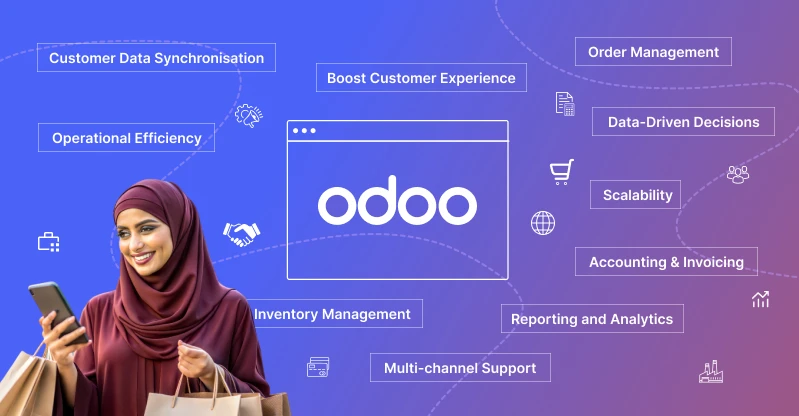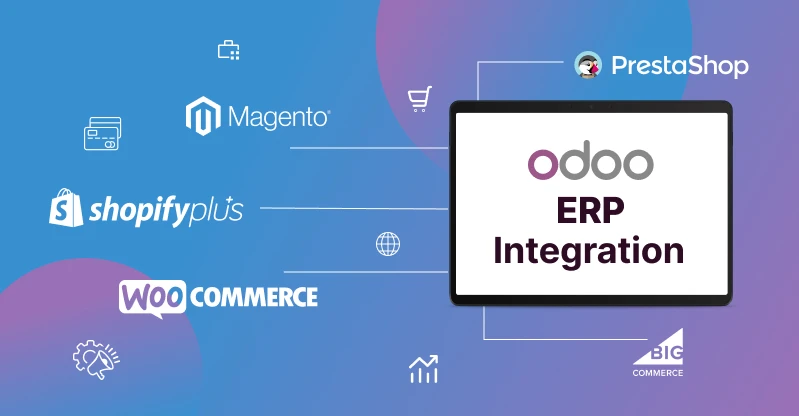The Top eCommerce Platforms for Odoo ERP Integration to Promote Business Development

Table of Contents
Integrating your eCommerce business with the right and powerful ERP system is critical. One of the most renowned and useful ERP systems is Odoo, an open-source ERP solution that is appropriate for any business of any size. It has a major market share of 12.88% in the ERP category.
The best part about Odoo is it can be easily connected with various eCommerce platforms to streamline operations and resource management and increase customer satisfaction.
This blog will look at the top eCommerce platforms that integrate seamlessly with Odoo ERP, highlighting their unique features and benefits for speeding up business growth.
Why Is Integrating Odoo Erp With Ecommerce Platforms Necessary?
Operational Efficiency
Connecting the Odoo ERP with your eCommerce platform can be beneficial for boosting operational efficiency. This process can be done by synchronising inventory, orders, customer information, sales and other critical data. The core benefit of this process is it helps to minimise the need for manual data entry which is helpful for reducing major errors and saving time. Hence, by conducting better synchronisation, the operational efficiency of the eCommerce business can be increased, which will be useful for driving positive business growth.

Boost Customer Experience
Improving customer experience is a major factor for eCommerce owners. With the Odoo ERP integration, this process can be streamlined by conducting real-time updates, and simplified order processing by accessing the inventory availability, order status and tracking information in real-time. It will be helpful in offering a reliable shopping experience.
It will also be helpful for increasing overall satisfaction and fostering trust to retain loyal customers.
Data-Driven Decisions
The key to business success is centralised data collection and analysis from multiple touchpoints. Implementing data can help retail owners make informed decisions. Companies that use a unified system to compile sales, customer behaviour, and performance metrics can quickly identify trends, spot opportunities, and adjust strategies to remain competitive in a dynamic eCommerce market.
Scalability
Managing numerous sales channels, growing order volumes, and extending product lines become difficult as businesses expand. Better resource management through Odoo ERP integration enables companies to grow profitably while retaining operational control, assuring their long-term survival and competitiveness in the market.
Inventory Management
The Odoo ERP system makes stock synchronisation across eCommerce platforms easy and helps keep inventory data up-to-date. This integration reduces the risk of overselling or stockouts while optimising warehouse operations and increasing customer satisfaction by ensuring accurate product availability at all times boost the customer experience.
Order Management
Managing the order is a critical task; therefore, conducting this process efficiently is important. Integrating your eCommerce business with the Odoo ERP can help you automate order fulfilment, including tracking, processing, and shipping. It leads to more accurate fulfilment, lowers manual errors, and improves operational efficiency, resulting in better customer experience.

Customer Data Synchronisation
Syncing user data has multiple benefits for online businesses. Odoo ERP integration automates order fulfilment, including tracking, processing, and shipping. It also helps ensure consistent user information across the system to boost data accuracy and security.
Accounting & Invoicing
By automatically creating invoices, handling payments, and monitoring spending, integrating accounting and invoicing software with Odoo ERP simplifies financial procedures. It also helps to save time and enhance cash flow management to maintain accurate financial records by reducing manual effort and errors.
Multi-channel Support
Businesses can use Odoo ERP to manage several sales channels or eCommerce stores from one platform. Because of this centralisation, which streamlines processes, lessens complexity, and improves control over every facet of the company, businesses are better equipped to handle a variety of markets and grow organically.
Reporting and Analytics
Businesses can generate detailed reports and obtain insightful information about their performance with the help of Odoo ERP integration. This facilitates data-driven decision-making, allowing companies to monitor key performance indicators, assess sales performance, and maximise expansion strategies to boost profitability.
Top eCommerce Platforms for Odoo ERP Integration
Magento
The open-source eCommerce platform Magento can be customised to meet the requirements of companies of any size. The best part about using Magento is it helps to deliver seamless PIM solutions, powerful features for SEO and higher flexibility that can be aligned with any business size.
Integrating Magento with odoo can deliver the best results, starting from streamlining inventory to order management; everything can be done by conducting a real-time data sync of user data, order details, and stock levels. It eventually helps to boost better customer relations and boost the conversion rate.
Shopify
Shopify is a well-known cloud-based eCommerce platform that helps create and easily manage online stores. Businesses that integrate Shopify with Odoo ERP come with a lot of benefits.
The Odoo Shopify Connector by Techspawn integrates Shopify with Odoo ERP, providing automated inventory updates, order fulfilment, and financial reporting while eliminating manual data entry for smoother operations and improved customer experiences.
This user-friendly collaboration allows the user to get real-time updates across both platforms and helps with data-driven decision-making by producing timely reports.

WooCommerce
WooCommerce is a popular WordPress eCommerce plugin that is ideal for any business. This platform’s core advantage is its flexible, open-source features for customisation. Integrating Odoo and WooCommerce automates inventory updates, order processing, and customer data management.
Orders from WooCommerce sync seamlessly with Odoo, automating stock adjustments and order fulfilment, reducing errors and expediting delivery. With the help of this integration, businesses can centralise customer profiles, inventory details, and other factors to allow for real-time data synchronisation. It will help them to minimise overselling and ensure product availability.
BigCommerce
BigCommerce is a robust eCommerce solution help to simplify business process. Order management, inventory synchronisation, and the generation of real-time financial reports from a single platform can all be achieved through integration with Odoo ERP. Time and money can be saved by using this integration’s automated eCommerce and business operations management solution.
BigCommerce is made to support the expansion of small businesses and comes with more features than other top platforms. The integration helps to manage store easily in Odoo to import orders, customer information, products, categories, attributes, variants, and more.
PrestaShop
The open-source eCommerce platform PrestaShop is perfect for small and medium-sized enterprises. Integrating PrestaShop with Odoo ERP automates financial tracking, inventory management, and customer data synchronisation.
Businesses can manage orders, products, categories, and customer information across several stores from a single platform to provide a comprehensive ERP solution. This odoo and prestaShop integration uplift decision-making and operational efficiency through real-time reporting.
Benefits of Odoo ERP Integration for eCommerce Businesses
Centralised Data Management
Integrating Odoo ERP with your eCommerce platform unifies all business operations, resulting in a centralised hub for data management. Inventory, sales, and customer information are all stored and managed on a single platform. It will help to reduce the problem of data silos and gives your team real-time access to the most accurate information, resulting in better decision-making and more efficient operations.
Higher Productivity
Odoo ERP automates repetitive tasks like inventory updates, order tracking, and invoicing, which reduces manual labour and human error. Employees can focus on strategic tasks rather than operational details, which increases productivity. When all systems are in sync, businesses can process orders faster and respond to customer enquiries more efficiently.
Cost Savings
By streamlining operations and eliminating redundant processes, Odoo ERP integration enables businesses to optimise resources and reduce operational costs. Automated inventory management eliminates overstocking and stockouts, while task automation reduces the need for additional labour. This reduces overall costs, allowing businesses to allocate resources more efficiently and scale without incurring significant financial burden
Improved Customer Satisfaction
Businesses can improve the overall customer experience by processing orders faster, updating inventory in real time, and automating customer service processes. Customers benefit from accurate product availability, faster shipping, and timely order updates, which lead to increased satisfaction and retention rates. Better communication between the eCommerce platform and the ERP system results in more seamless service.
Scalable Solutions
As your company grows, Odoo ERP enables seamless scalability by accommodating increased order volumes, inventory, and customer data without disrupting business operations. The system grows with you, ensuring that your operations run smoothly and efficiently even as your customer base or product offerings expand. This scalability contributes to long-term business growth and success.

Steps to Integrate Odoo ERP with Your eCommerce Platform
Evaluate Business Needs
Before integrating Odoo ERP, you must first identify your company’s specific needs.Think about what you want to achieve with the integration and choose the right features. It will help to achieve your goals more appropriately.
Choose the Right Connector
Depending on the eCommerce platform you use, there are various connectors or modules available to integrate with Odoo ERP. It’s critical to choose a connector that works with your platform (e.g., Magento, Shopify, WooCommerce) and meets your business requirements. This ensures that the integration runs smoothly and allows for real-time data synchronisation between systems.
Configure and Customise
Once the connector is installed, the next step is to configure and customise the integration to match your specific business processes. This entails creating workflows for order processing, inventory management, and customer data handling while tailoring the system to your specific operational requirements. Customisation ensures that the integration is seamless and efficient.
Integration Testing
Before fully implementing the integration, it must be thoroughly tested. This includes verifying data flow between Odoo ERP and the eCommerce platform, as well as ensuring that orders, inventory levels, and customer information are synchronised correctly. Testing identifies any issues that may disrupt operations and allows for changes to be made before going live.
Monitor and Optimise
Once the integration is live, continuous monitoring is required to ensure that everything runs smoothly. Keep an eye on data synchronisation, order fulfilment, and system performance. Over time, you may discover areas for improvement, whether by adding new features or optimising existing processes. Regular updates and maintenance ensure that the integration remains functional and scalable.
Conclusion
You can boost customer satisfaction and business efficiency by integrating Odoo ERP with your eCommerce platform. It improves scalability, centralises data, and automates processes. Over 4.5 million people use Odoo for their business needs, according to an Odoo survey, and its usage is growing daily.
This means you can manage multiple sales channels, broaden your product offerings, and streamline internal operations. Businesses that integrate and optimise Odoo ERP can save money, make better decisions, and expand smoothly in the competitive eCommerce industry.
However, selecting the right eCommerce platform for co-operation with Odoo is not an easy task. Therefore, connecting with an odoo expert is majorly important. Choose your appropriate platform and grow your business efficiently.

